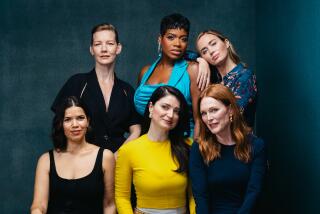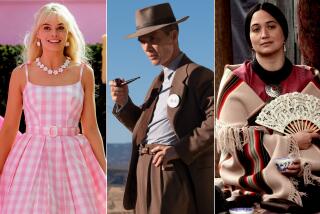The Performance: Rosario Dawson in ‘Unstoppable’
Rosario Dawson has remarkable diction for someone who talks so quickly — and, as she readily points out, someone who never formally trained in acting, a point that has shadowed her for more than a decade.
“It’s been the past couple of years that I thought I could say that I’m an actor,” says Dawson in rapid-fire speech. She was discovered on her Manhattan stoop as a teen and cast in 1995’s “Kids,” but with that stroke of fortune came a haunting insecurity. “I was waiting for that Apollo [Theatre] hook to yank me offstage and say, ‘I don’t know how you got in here, but this Juilliard-trained actress is about to go on. So you need to shuffle along, little miss.’ And I’d be like, ‘I get it.’ I never took it for granted that [acting] was always going to be there.”
More than 40 credits later, the actor-activist stars in Tony Scott’s “Unstoppable,” an actioner very loosely based on actual events. She plays yardmaster Connie Hooper, the voice of reason moderating between bottom-line-worshiping corporate guys and a heroic veteran engineer ( Denzel Washington) and hotheaded rookie conductor ( Chris Pine) chasing a runaway train carrying poisonous gas. Dawson’s youthful pursuits served her well for her role as the coolheaded, logical one in the crisis.
“I’m a very practical person, unlike a lot of my solely artistic family and friends. I’ve always thought that college was going to be the way out. I grew up in a squat on the Lower East Side and thought that was cool, but didn’t want to raise my kid like that. I was big on calculus and loved science. That part of me has not gone away, my curiosity about things,” she says. (Maybe it’s that logical side that led her to a certain Vulcan and her proud Trekkie status. She says as a “Star Trek” fan, she still somehow managed to keep her excitement at working with the new Captain Kirk — Pine — to herself.)
“Biology was the thing I loved most, sciences. I dissected an eyeball, a lung, a knee joint. I’m just curious about things.”
That curiosity led her to explore not only the character of Connie, but the world of railroads.
“I loved not doing the clichéd, obvious stuff of making her this über-strong, bitchy, top woman, but someone who’s in control and experienced and doesn’t have anything to prove. It was fun knowing I wasn’t going to be playing someone’s girlfriend or something,” she says, adding that Connie earned her position at the yard and didn’t get any slack from her co-workers. “‘We’re going to be tough with you, see if you can handle it, because these are high-stakes situations every single day.’ People are killed by trains going 4 miles an hour.”
The actress’ perception of the railroad industry changed while working on the film.
“Railroads seem so separate from everything else; it’s part of the hum of the background of American life. But the reality is, it’s the arteries and veins of America. So [the film’s potential disaster] could destroy a whole area, but it could also stop us from having spinach on the entire Eastern seaboard,” she says, then adds with a smile, “Trains have always been a background character, but in this it’s a main character. It’s the diva, as a matter of fact. That train was a bitch.”
The energetic Dawson continues to find a balance between acting and activism with groups such as Voto Latino as she believes in herself more and more as an artist.
“I think because that hook never came, I realized in order to be a better actor, you have to allow yourself to call yourself an actor and not to feel silly about it,” she says briskly.
“One of the people who’s great about that is Denzel. He shows just how noble it is to do what he does. If I want to work with people like that, I have to get over the hang-up of whether or not I belong. It’s been 16 years. I’ve got to up the ante.”



